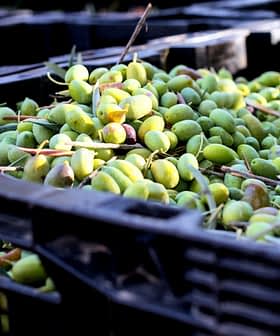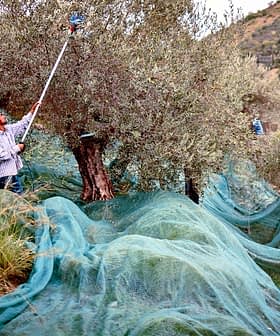Spain and Italy Ask Restaurants to Comply with Olive Oil Container Laws
Spain and Italy are urging restaurants to comply with long-standing bans on refillable olive oil containers through new enforcement efforts and consumer awareness campaigns.
 Fines for the illegal use of refillable containers in restaurants have failed to curb the practice.
Fines for the illegal use of refillable containers in restaurants have failed to curb the practice. Spain and Italy are facing challenges with the continued use of refillable olive oil containers in restaurants, prompting the Interprofessional Olive Oil Organization to launch a campaign targeting restaurants, consumers, and institutions, despite the practice being banned in several European Union countries for over a decade. In response to the issue, Italy has introduced new regulations to ensure that extra virgin olive oil is served in bottled, labeled form with a tamper-proof cap, while Greece has seen many restaurants remove olive oil containers from customer tables altogether due to updated regulations.
The continued use of refillable olive oil containers in restaurants remains a pressing issue for the olive oil sector in Spain and Italy.
The practice persists despite being banned in several European Union countries for over a decade.
This ongoing issue prompted Spain’s Interprofessional Olive Oil Organization to launch a new campaign targeting restaurants, consumers and institutions.
See Also:An Accusation of Widespread Fraud Sparks Controversy in Spain“What quality does an anonymous package offer me? What is its best-before date? Who is responsible in the event of a food safety issue? And, most importantly, how can I be sure that it contains extra virgin olive oil and not a blend of other fats?,” Pedro Barato, president of the Interprofessional, wrote in a press statement.
The new campaign, which will run until April, will follow the model of a previous initiative called “#Peeerdona,” widely promoted on television, social media, and other platforms between 2017 and 2018.
Renowned Spanish actress Rossy de Palma was among the celebrities who participated in the campaign’s promotional videos.
The initiative includes new advertisements, outreach efforts, and a series of meetings between the olive oil sector and central and regional governments.
These meetings aim to coordinate a new round of inspections and enforcement actions nationwide.
“There is no doubt that implementing this regulation was a significant step forward. For the first time, hospitality customers could be certain about the product they were consuming,” Barato added.
“We cannot have laws banning this practice while allowing those who ignore them to continue unpunished. We demand that the law be upheld,” he added.
Juan Antonio Tello, manager at Tello Laboratories in Jaén, which specializes in olive oil analysis, noted that fines for the illegal use of refillable containers in restaurants have failed to curb the practice.
“This is a widespread practice. Anonymous packaging offers no guarantee of origin and, therefore, no guarantee of safety,” Tello told Olive Oil Times.
“These factors not only mislead consumers but also eliminate any assurance regarding the quality and safety of the olive oil they consume,” he added.
Some restaurants argue that the added cost of sealed bottles is a key concern.
“The best solution is consumer education, helping them recognize proper presentation and appreciate high-quality extra virgin olive oil,” Tello said. “Without this awareness and appreciation of what they’re being served, progress will be difficult.”
Tello suggested that olive oil advertising campaigns should emphasize the different quality levels of olive oil and their culinary and health benefits.
“It would also be beneficial to have dedicated information points in participating restaurants and bars,” Tello said.
In Italy, olive oil producers from Unaprol, in collaboration with the farmers’ organization Coldiretti, launched an initiative at the start of the new olive season in the fall.
The two organizations announced a new decalogue to help consumers choose quality olive oils and ensure their rights are respected in restaurants.
“The refillable container is forbidden in restaurants. [As customers] we demand that extra virgin olive oil be served in bottled, labeled form, protected by a tamper-proof cap,” they wrote.
Additionally, across the country, several initiatives aim to add value to restaurants that legally promote high-quality extra virgin olive oils and showcase extra virgin olive oil diversity to their customers.
“Since the regulation came into effect, the ICQRF has been conducting specific inspections at food service establishments to ensure compliance with this provision,” officials of the Italian Central Inspectorate of Quality Protection and Fraud Prevention of Agri-food Products (ICQRF) told Olive Oil Times.
The law does not apply to restaurant kitchens in Spain and Italy. The use of olive oil or extra virgin olive oil is instead subject to regulations governing the quality of ingredients used in food preparation.
Portugal, one of the European Union’s major olive oil producers, has banned refillable olive oil bottles since 2005. According to local experts, this change has positively impacted consumer awareness of quality olive oil.
Greece, another major olive oil producer, introduced new regulations in 2013 and has since undergone several updates. However, the response to the law took a different turn.
As a result of these requirements, many restaurants in Greece removed olive oil containers from customer tables altogether.
Share this article









